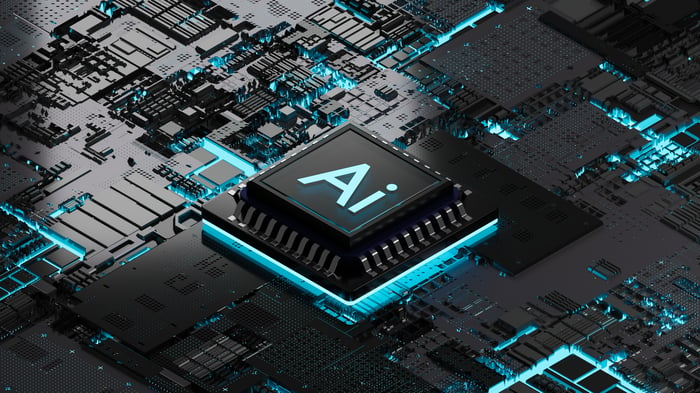If you are intrigued by the potential of investing in technology stocks, particularly those at the forefront of capitalizing on the advancements in artificial intelligence (AI), the Vanguard Information Technology ETF (NYSEMKT: VGT) emerges as a compelling avenue.
The exchange-traded fund (ETF) meticulously shadows the MSCI U.S. Investable Market Information Technology 25/50 Index, encompassing companies engaged in cloud computing, semiconductors, data centers, as well as communication equipment like smartphones and computers, among other sectors.
An Impressive Track Record
The Information Technology ETF boasts a robust trajectory, boasting an impressive average annual return of 20.3% over the past decade until the end of May. This translates to a staggering cumulative return of close to 535% during that timeframe. Hypothetically, a $10,000 investment made a decade ago could have burgeoned to almost $63,500.
Recent returns have been even more compelling, with an average annual return of 23.5% over the last five years and an astounding 29.1% over the past year.
In addition, the ETF boasts a trifling 0.10% expense ratio. This implies that the management fees on a $10,000 investment would amount to merely $10.
The Weight of the Portfolio
The Vanguard ETF holds substantial weight in its principal three holdings, all of which seem poised to reap significant long-term rewards from AI.
As of the conclusion of May, Nvidia (NASDAQ: NVDA) emerged as the third-largest holding in the ETF, constituting 14% of its portfolio. With the company recently ascending to the position of the world’s largest firm, it wouldn’t be surprising if it has ascended to become its premier holding given the recent surge in its stock performance.
Nvidia has emerged as a major beneficiary of the AI boom thus far, with its graphic processing units (GPUs) serving as the cornerstone of the AI infrastructure construction. Its chips are pivotal for training large language models (LLMs) and facilitating inference.
The company has managed to carve out a substantial competitive advantage with its Compute Unified Device Architecture (CUDA), the software platform on which a majority of developers have been trained to program GPU chips.
While its remarkable growth may decelerate due to the law of large numbers, Nvidia still appears primed to remain a dominant force in AI given the widespread adoption of its technology in the industry.
The ETF’s second-largest holding at the close of May was Apple (NASDAQ: AAPL), accounting for 15.9% of its portfolio. Despite challenges in revenue growth over the past year, the company seems on the brink of reaping benefits from AI soon.
Apple isn’t typically a pioneer in technology but excels in delivering top-notch devices. The company recently introduced a slew of AI features to be integrated into its Apple Intelligence platform, set to roll out on its operating systems for smartphones, tablets, and computers. These advancements, requiring cutting-edge technology, are anticipated to stimulate a hardware upgrade cycle that will propel the company and its stock.
Leading the ETF at the end of May was Microsoft (NASDAQ: MSFT), constituting 16.7%. Among the first megacap tech companies to embrace AI through a substantial investment in OpenAI, Microsoft’s cloud computing unit, Azure, has reaped the greatest rewards from this move thus far. Customers building their own AI applications using its platform fuelled a 31% growth in the segment last quarter.
Moreover, other segments of its business have begun to capitalize on its AI assistant Copilot, fueling growth for its developer platform GitHub and Microsoft 365.

Image source: Getty Images.
Contemplating the Investment in this ETF
For investors eyeing an entry into the realm of AI investments, the Vanguard Information Technology ETF stands out as a promising choice. Nvidia, Microsoft, and Apple jointly constituted 46.6% of the ETF’s holdings at the close of last month. As these three stocks progress, so will the ETF — and all appear poised to continue reaping the benefits of AI.
These three aren’t the sole stocks in the ETF’s principal holdings capable of making such a claim. Broadcom, Advanced Micro Devices, Qualcomm, and Adobe also feature in that category.
Given that AI is still in its nascent stages, the present seems opportune to welcome the Vanguard Information Technology ETF into your investment portfolio.
The Allure of Potential Investments
Before considering an investment in the Vanguard Information Technology ETF, contemplate this:
The Motley Fool Stock Advisor analyst team recently identified what they deem to be the 10 best stocks for investors to acquire now… and Vanguard Information Technology ETF wasn’t among them. The 10 stocks on that list hold the potential to yield significant returns in the forthcoming years.
Imagine the scenario when Nvidia made this list on April 15, 2005… If you had invested $1,000 at the time of our recommendation, you’d be sitting on $772,627 today!*
Stock Advisor furnishes investors with a straightforward path to success, including guidance on constructing a portfolio, periodic updates from analysts, and two new stock recommendations each month. The Stock Advisor service has quadrupled the return of the S&P 500 since 2002*.
*Stock Advisor returns as of June 24, 2024
Geoffrey Seiler has no position in any of the stocks mentioned. The Motley Fool has positions in and recommends Adobe, Advanced Micro Devices, Apple, Microsoft, Nvidia, and Qualcomm. The Motley Fool recommends Broadcom and recommends the following options: long January 2026 $395 calls on Microsoft and short January 2026 $405 calls on Microsoft.
